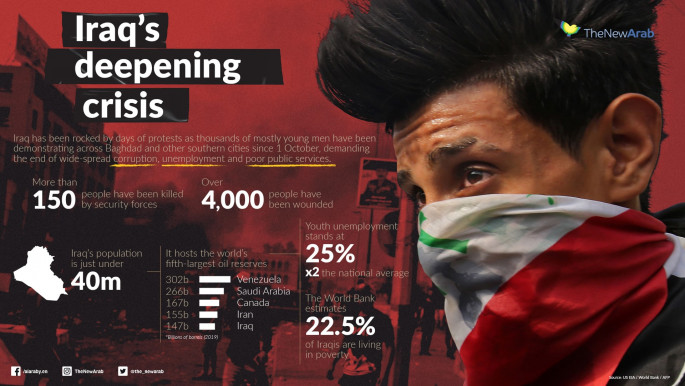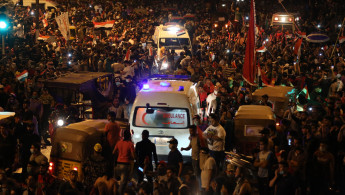Iraq protest death toll rises to 21 after brutal crackdown by security forces
The protests represent a second phase of a week-long movement in early October demanding an end to widespread corruption, unemployment and an overhaul of the political system.
Activists urged Iraqis to return to the streets on Friday, which marks a year since Prime Minister Adel Abdel Mahdi came to power.
But the rallies began early, with hundreds already gathering in the capital's iconic Tahrir (Liberation) Square on Thursday evening.
On Friday, many crossed the bridge to mass near Baghdad's Green Zone, which hosts government offices and foreign embassies, but security forces used a volley of tear gas to push them back.
"Two demonstrators died, with preliminary information indicating they were hit in the head or face by tear gas canisters," said Ali Bayati, a member of the Iraqi Human Rights Commission.
He said nearly 100 more were wounded, but there were no reports of live fire being used to disperse protesters in the capital.
Read more: After years of suffering and neglect, angry Iraqis refuse to be silenced
But in the southern city of Amarah, five protesters were shot dead as they tried to storm the headquarters of the powerful Asaib Ahl al-Haq armed faction, medics and security sources said.
And in nearby Nasiriyah, another five protesters were shot dead and 18 wounded.
Thousands had gathered there in the afternoon, setting fire to the government's provincial headquarters.
Others across the south set light to more than a dozen political party headquarters and offices of parliamentarians.
Two more protesters died of burns sustained when setting fire to one of the offices.
— Mosul Eye عين الموصل (@MosulEye) October 25, 2019
" style="color:#fff;" class="twitter-post-link" target="_blank">Twitter Post
|
Several other political party offices were also set on alight in the demonstrations elsewhere in the south, police said.
"We're not hungry - we want dignity!" a protester shouted in Baghdad on Friday morning, while another lashed out at "the so-called representatives of the people who have monopolised all the resources".
"Adel Abdel Mahdi is lying to us," protesters shouted in Baghdad, just hours after the premier's televised appearance in which he defended his reform agenda.
"They are all liars - they lie when they promise us jobs and when we protest, they fire tear gas at us!" shouted another.
Iraq's highest Shia authority Grand Ayatollah Ali al-Sistani had earlier called on demonstrators to stay peaceful, and said security forces should "deal with them with the utmost restraint."
Also read: 'We want dignity': Two killed as massive anti-government protests rock Iraq
"The authority's insistence that protests must remain peaceful, without any violence, stems not only from its interest in keeping protesters and security forces from being hurt but also from its extreme care for the country's future," he added.
"Chaos and ruin," he warned, would "pave the way for more external interference".
Brutal crackdown by security forcesIraqis are protesting unemployment, corruption and lack of public services across the country, and tens of thousands have taken to the streets in so far.
This movement is unprecedented in Iraqi history because of its spontaneity and independence, and because of the brutal violence with which the demonstrators were met during the first wave on October 1-6.
At least 157 people were killed, according to a government probe published on Tuesday, which acknowledged that "excessive force" was used. The majority of them were protestors in Baghdad, with 70 percent shot in the head or the chest.
Prime Minister Adel Abdel Mahdi issued several measures to ease public anger, including higher pensions for the families of those who were killed. He defended his reform agenda in a television appearance on Friday, telling protesters that it was their "right" to demonstrate as long as they did not "disturb public life".
Iraq has been destroyed by violence and conflict since the American invasion in 2003, but relative calm was restored in 2017 when the Islamic State group was defeated.
However the country has been economically destroyed through war, corruption and mismanagement, leaving people with no financial prospects or stability.
 |
|
| [click to enlarge] |
Agencies contributed to this report
Follow us on Twitter: @The_NewArab





 Follow the Middle East's top stories in English at The New Arab on Google News
Follow the Middle East's top stories in English at The New Arab on Google News
![Both Hamas and the Palestinian Authority welcomed the ICC arrest warrants [Getty]](/sites/default/files/styles/image_330x185/public/2024-11/GettyImages-2178351173.jpg?h=199d8c1f&itok=TV858iVg)

